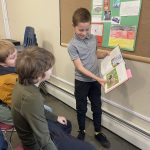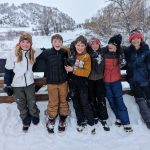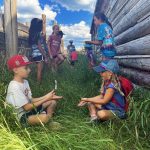A reflection on MLK Day from Joan Davis, History Faculty
Mountain Connection, January 17th, 2022
The mid 1900s marked an era of tension and extreme contradiction. It was a time where black people in the United States were freed of slavery, freed of the chains that barred them to land and white masters. A time where one hoped that all people were not only created equal, but treated equal. American identity in the 1950s fissured between races, genders roles, and political beliefs. A foundation of this division were the views and behaviors towards a group of people that just looked different. Our country was colored by segregation and exclusion of race; the existence of parallel and unequal worlds.
Martin Luther King Jr. grew up in a home aspiring for equality. While shopping for shoes with his father they refused to sit in the ‘colored only’ section of an empty store. They decidedly walked out empty handed, his father saying, “I don’t care how long I have to live with this system, I will never accept it.”
Inspired by Mahatma Gandhi’s strategy of nonviolent resistance, MLK fought injustice with boycotts and sit-ins. The Montgomery, AL Bus Boycott lasted 381 days. 381 days of walking to work, violence, harassment and intimidation for Montgomery’s African American community. On the 382nd day the Supreme Court ruled that segregation on public buses was unconstitutional. This marked a groundbreaking win against racism, and proof that peaceful protest can lead to change.
King’s skillful rhetoric injected new energy into the civil rights struggle and united people under a common cause. Not only did King fight for equality among the African American community, but also against poverty and the Vietnam War. MLK fought for everyone chained by discrimination, regardless of race. King was jailed 20 times, stabbed once, and survived a house bomb. Throughout the danger and targeted attacks, he continued to preach principles of fairness and opportunity through nonviolence.
In his famous ‘I Have A Dream’ speech, King said, “In the process of gaining our rightful place, we must not be guilty of wrongful deeds. Let us not seek to satisfy our thirst for freedom by drinking from the cup of bitterness and hatred. We must forever conduct our struggle on the high plane of dignity and discipline. We must not allow our creative protest to degenerate into physical violence.”
Today we celebrate someone who stood up against the grain of systemized racism. Someone who fought with his words and chose love over anger. His son recalls his father saying, “I love everybody. I am every man’s brother. You may not love me, but that’s your issue, not mine.” MLK’s ability to see the world through love during a time of so much hate is a reflection of his character and spirit.
Imagine, what would our world look like if we always choose love? How would we act if we treated everyone as family? How would our communities operate if we truly harnessed the belief that everyone deserves opportunity, fairness, love and kindness? Many of MLK’s words remain relevant today. I encourage our community to sit and reflect on the progress our country has made and the leaps still to come.
Today, at Steamboat Mountain School, we are appropriately celebrating the legacy of Martin Luther King Jr. by attending school. MLK viewed education as a powerful weapon. He entered college at age 15 and earned his doctorate at Boston University. The phrase ‘the pen is more powerful than the sword’ is ingrained in King’s philosophy.
To finish off, I want to share an excerpt from Poet Laureate Amanda Gorman’s ‘The Hill We Climb’. This poem reflects on the divisions that exist today and our ability to mend them.
“We [America] are far from polished, far from pristine, but that doesn’t mean we are striving to form a union that is perfect.
We are striving to forge our union with purpose.
To compose a country committed to all cultures, colors, characters and conditions of man.
And so we lift our gaze, not to what stands between us, but what stands before us.
We close the divide because we know that to put our future first, we must first put our differences aside.
We lay down our arms so we can reach out our arms to one another.
We seek harm to none and harmony for all.”
This morning I asked students as they navigated the day, to look at the photos and read the quotes that are posted on the school walls. I challenged them to interact with others through love, to see each other as human beings, and to embrace the opportunity they have to harness their education to make a difference.



